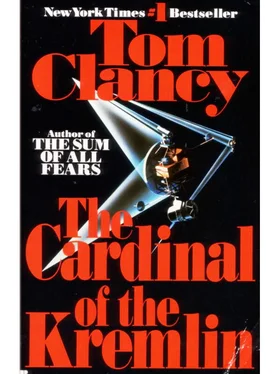Tom Clancy - The Cardinal of the Kremlin
Здесь есть возможность читать онлайн «Tom Clancy - The Cardinal of the Kremlin» весь текст электронной книги совершенно бесплатно (целиком полную версию без сокращений). В некоторых случаях можно слушать аудио, скачать через торрент в формате fb2 и присутствует краткое содержание. Год выпуска: 1988, Жанр: Триллер, на английском языке. Описание произведения, (предисловие) а так же отзывы посетителей доступны на портале библиотеки ЛибКат.
- Название:The Cardinal of the Kremlin
- Автор:
- Жанр:
- Год:1988
- ISBN:нет данных
- Рейтинг книги:3 / 5. Голосов: 1
-
Избранное:Добавить в избранное
- Отзывы:
-
Ваша оценка:
- 60
- 1
- 2
- 3
- 4
- 5
The Cardinal of the Kremlin: краткое содержание, описание и аннотация
Предлагаем к чтению аннотацию, описание, краткое содержание или предисловие (зависит от того, что написал сам автор книги «The Cardinal of the Kremlin»). Если вы не нашли необходимую информацию о книге — напишите в комментариях, мы постараемся отыскать её.
The Cardinal of the Kremlin — читать онлайн бесплатно полную книгу (весь текст) целиком
Ниже представлен текст книги, разбитый по страницам. Система сохранения места последней прочитанной страницы, позволяет с удобством читать онлайн бесплатно книгу «The Cardinal of the Kremlin», без необходимости каждый раз заново искать на чём Вы остановились. Поставьте закладку, и сможете в любой момент перейти на страницу, на которой закончили чтение.
Интервал:
Закладка:
"Yes, Comrade Colonel?"
"Take this down to Central Files – Section 5, maximum security. Oh, and where's today's burn-bag?"
"I have it, Comrade."
"Get it for me." The man went back to the anteroom and returned a moment later with the canvas bag that went daily to the document-destruction room. Misha took it and started putting papers into it. "Dismissed. I'll drop this off on the way out."
"Thank you, Comrade Colonel."
"You work hard enough, Yuri Il’ych. Good night." When the door closed behind his secretary, Misha produced some additional pages, documents that had not originated at the Ministry. Every week or so he took care of the burn-bag himself. The warrant officer who handled Filitov's clerical work assumed that it was because of his Colonel's kindness, and perhaps also because there were some especially sensitive papers to be destroyed. In any case, it was a habit that long predated his own service to the Colonel, and the security services viewed it as routine. Three minutes later, on the way to his car, Misha walked into the destruct room. A young sergeant greeted the Colonel as he might have greeted his grandfather, and held open the chute to the incinerator. He watched as the Hero of Stalingrad set down his briefcase and used his crippled arm to open the bag as the good arm elevated it, dumping perhaps a kilogram of classified documents into the gas-fed fire in the Ministry's basement.
He could not have known that he was helping a man destroy evidence of high treason. The Colonel signed off in the log for having destroyed the documents from his section. With a friendly nod, Misha left the burn-bag on its hook and walked out the door to his waiting staff car.
Tonight the ghosts would come again, Misha knew, and tomorrow he'd take steam again, and another package of information would go to the West. On the way to his apartment, the driver stopped off at a special grocery store that was open only to the elite. Here the lines were short. Misha bought some sausage and black bread, and a half-liter bottle of Stolychnaya vodka. In a gesture of comradeliness, he even got one for his driver. For a young soldier, vodka was better than money.
In his apartment fifteen minutes later, Misha extracted his diary from its drawer, and first of all reproduced the diagram appended to Bondarenko's report. Every few minutes he'd spend a second or two looking at the framed photograph of his wife. For the most part, the formal report had tracked with the handwritten one; he had to write only ten new pages, carefully inserting the critical formulae as he went. CARDINAL reports were always models of brevity and clarity, something that came from a lifetime of writing operational directives. When he was finished, he put on a pair of gloves and walked into the kitchen. Magnetically attached to the back side of the steel panel at the bottom of his West German-made refrigerator was a small camera. Misha operated the camera with ease, despite the inconvenience of the gloves. It took only a minute for him to photograph the new diary pages, after which he rewound the film and extracted the film cassette. He pocketed this and replaced the camera in its hiding place before removing the gloves. Next he adjusted the window shades. Misha was nothing if not careful. Close examination of his apartment's door would show scratches on the lock, indicating that it had been picked open by an expert. In fact, anyone could make the scratches. When it was confirmed that his report had reached Washington – tire scuff marks on a predetermined section of curb – he'd tear the pages out of the diary, take them to the Ministry in his pocket, put them in the burn-bag, and dump them down the chute himself. Misha had supervised the installation of the document-destruction system twenty years before.
When the task was complete, Colonel Mikhail Semyonovich Filitov looked again at Elena's picture and asked if he'd done the right thing. But Elena merely smiled as she had always done. All these years , he thought, and it still troubles my conscience. He shook his head. The final part of the ritual followed. He ate sausage and bread while his long-dead comrades of the Great Patriotic War came to visit, but he couldn't bring himself to ask those who had died for their country if he was justified in betraying it. He thought they would understand even better than his Elena, but was afraid to find out. The half-liter of vodka didn't provide the answer either. At least it drugged his brain to insensibility, and he staggered off to bed just after ten, leaving the lights on behind him.
Just after eleven, a car drove by the wide boulevard that fronted the apartment block, and a pair of blue eyes checked the Colonel's windows. It was Ed Foley this time. He noted the shades. On the way to his own flat, another covert message was passed. A Moscow sanitation worker set up a collection of signals. They were innocuous things, a chalk mark on a lamp post, for example, each of which would tell a part of the cutout team to be at their assigned posts. Another member of the CIA Moscow Station staff would check the cues at dawn, and if anything was amiss, Foley himself could abort everything.
As tense as his job was, Ed Foley found many aspects of it amusing. For one thing, the Russians themselves had made it easier by giving CARDINAL an apartment on a heavily traveled street. For another, in making such a hash of the new embassy building, they prevented him and his family from living in the new compound, and that forced Foley or his wife to drive down this boulevard every night. And they were so glad to have his son on their hockey team. That was one thing he'd miss on leaving this place, Foley told himself as he got out of the car. He now liked junior-league hockey better than baseball. Well, there was always soccer. He didn't want his son to play football. Too many kids got hurt, and he'd never be big enough. But that was in the future, and he still had the present to worry about.
He had to be careful saying things aloud in his own apartment. Every room in every flat occupied by Americans was assumed to be more heavily bugged than an ant farm, but over the years, Ed and Mary Pat had made a joke of that, too. After he came in and hung up his coat, he kissed his wife, then tickled her ear at the same time. She giggled in recognition, though both were thoroughly tired of the stress that came with this post. Just a few more months.
"So how was the reception?" she asked for the benefit of the wall microphones.
"The usual crap," was the recorded answer.
CHAPTER 9
Opportunities
Beatrice Taussig didn't make up a report, though she considered the slip Candi had made significant. Cleared for nearly everything that happened at Los Alamos National Laboratory, she hadn't been told about an unscheduled test, and while some SDI work was being done in Europe and Japan, none of it required Al Gregory as an interpreter. That made it Russian, and if they'd flown the little geek to Washington – and, she remembered, he'd left his car at the lab; so they'd sent him a helicopter, too – it had to have been something big. She didn't like Gregory, but she had no reason to doubt the quality of his brain. She wondered what the test was, but she wasn't cleared for what the Russians were up to, and her curiosity was disciplined. It had to be. What she was doing was dangerous.
But that was part of the fun, wasn't it? She smiled to herself.
"That leaves three unaccounted for." Behind the Afghans, the Russians were sifting through the wreckage of the An-26. The man talking was a KGB major. He'd never seen an air crash before, and only the cold air on his face had kept him from losing his breakfast.
"Your man?" The infantry Captain of the Soviet Army – until very recently a battalion advisor to the puppet Afghan Army – looked around to make sure his troops were manning the perimeter properly. His stomach was as settled as it could be. Watching his friend nearly gutted before his eyes had been the greatest shock of his life, and he was wondering if his Afghan comrade would survive emergency surgery.
Читать дальшеИнтервал:
Закладка:
Похожие книги на «The Cardinal of the Kremlin»
Представляем Вашему вниманию похожие книги на «The Cardinal of the Kremlin» списком для выбора. Мы отобрали схожую по названию и смыслу литературу в надежде предоставить читателям больше вариантов отыскать новые, интересные, ещё непрочитанные произведения.
Обсуждение, отзывы о книге «The Cardinal of the Kremlin» и просто собственные мнения читателей. Оставьте ваши комментарии, напишите, что Вы думаете о произведении, его смысле или главных героях. Укажите что конкретно понравилось, а что нет, и почему Вы так считаете.






![Александр Ирвин - Tom Clancy’s The Division 2. Фальшивый рассвет [litres]](/books/417744/aleksandr-irvin-tom-clancy-s-the-division-2-falsh-thumb.webp)





